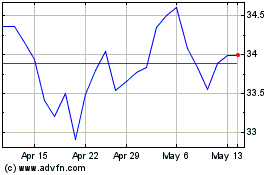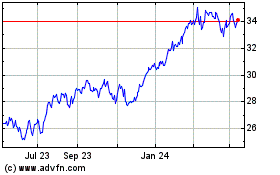NAB Full Year Profit Rises 8.3% -- Update
November 08 2022 - 5:24PM
Dow Jones News
By Alice Uribe
SYDNEY--National Australia Bank Ltd. said rising interest rates
helped its annual profit to increase by 8.3%, with the lender
lifting its final dividend by 16%.
The bank said net profit for the 12 months through September
rose to 6.89 billion Australian dollars (US$4.48 billion). Analysts
had expected a full-year net profit of A$7.16 billion, according to
FactSet's consensus estimate.
"An ongoing focus on strong balance sheet settings has been key
to delivering sustainable growth and keeping the bank safe," Chief
Executive Ross McEwan said. "After 11 years of interest rate
reductions, earnings have also benefited in FY 2022 from the rising
interest rate environment."
Directors of the company raised its final dividend by 16% to
A$0.78 per share, compared with A$0.67 last year.
Cash earnings--a profitability measure tracked closely by
analysts--rose by 8.3% to A$7.10 billion. Stripping out the impact
of the Citi consumer business acquired in June, revenue rose by
7.8%, which the lender said reflected higher volumes and slightly
higher margins excluding its Markets & Treasury unit.
NAB's Corporate and Institutional banking unit was a standout
with annual cash earnings up 35% to A$1.63 billion, while the
Business and Private Banking unit's cash earnings rose 22% to
A$3.01 billion. Still, NAB's Personal Banking unit's cash earnings
fell by 3.6% to A$1.60 billion, which the lender attributed to
margin pressure from home lending.
NAB's full-year net interest margin--the difference between the
interest income generated and the amount of interest paid out to
lenders--fell 6 basis points to 1.65%, but on an adjusted basis it
rose 1 basis point. The lender said this primarily reflected higher
earnings on deposits and capital as a result of the rising interest
rate environment, but said this was mostly offset by mortgage
competition.
"In home lending, process and technology improvements and
further development of our simple and digital home loan platform
are delivering better service outcomes in FY 2022. Unconditional
approval times reduced compared with FY 2021," said NAB.
The lender sees the Australian mortgage market changing in the
future, with credit demand slowing and a push toward refinancing,
which will increase competitive pressure between lenders.
"While there are a number of uncertainties in the outlook, the
most likely scenario has forecast inflation peaking in the December
2022 quarter before easing through 2023," said NAB. "This would see
the cash rate peak at 3.60% in March 2023, but a more inflationary
outcome would likely mean greater monetary policy tightening and a
more pronounced economic correction."
The group's Common Equity Tier 1 capital ratio was 11.51% at the
end of September, compared with 13% the previous year.
Write to Alice Uribe at alice.uribe@wsj.com
(END) Dow Jones Newswires
November 08, 2022 17:09 ET (22:09 GMT)
Copyright (c) 2022 Dow Jones & Company, Inc.
National Australia Bank (ASX:NAB)
Historical Stock Chart
From Feb 2025 to Mar 2025

National Australia Bank (ASX:NAB)
Historical Stock Chart
From Mar 2024 to Mar 2025
